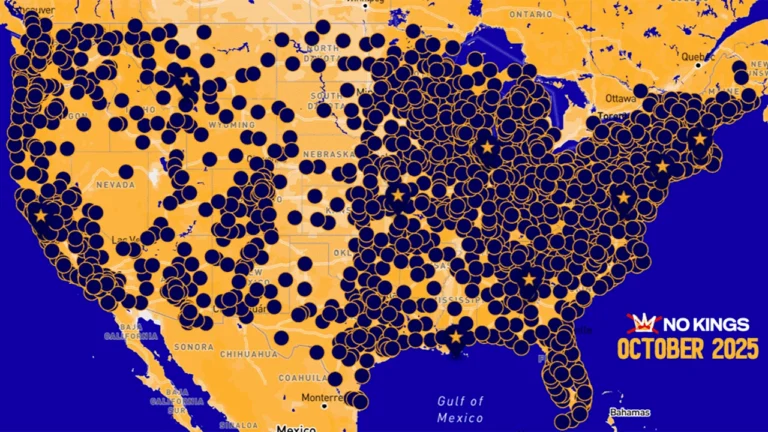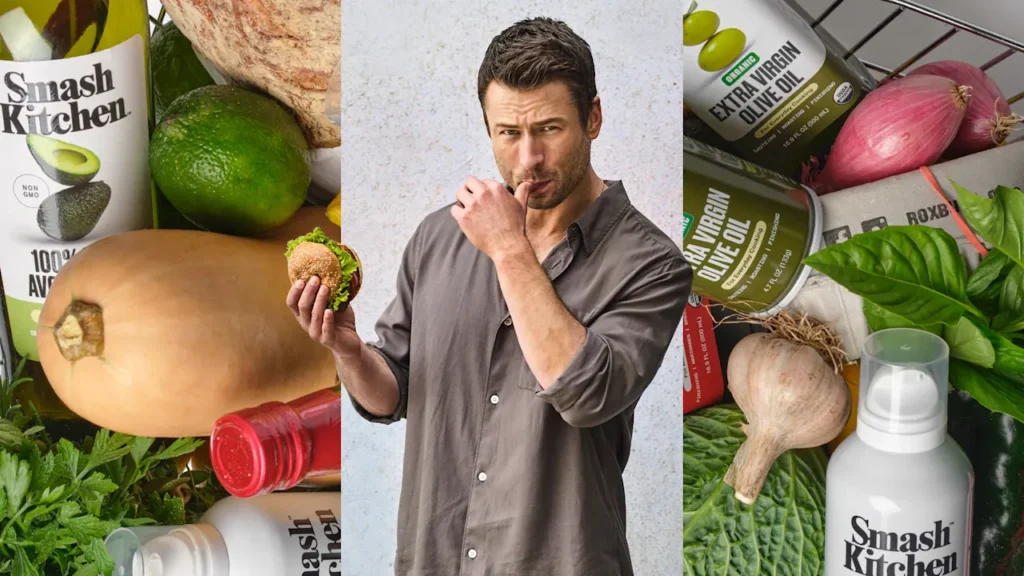
Glen Powell has proven that he can hold it down as the star of blockbuster movies, from Twisters to Hit Man. But on October 3, in his hometown of Austin, he was holding down the grill at the parking lot of his local Walmart.
Powell’s grill work was pulling double duty as promotion for his new TV comedy, Chad Powers, and for Smash Kitchen, his clean food brand, which launched at Walmart in April. The brand debuted with a suite of condiments including ketchup, mustard, mayonnaise, and barbecue sauce that look and taste on par with heritage brands but are made with all-organic ingredients. Priced from $1.97 to $4.97, they’re just pennies more expensive than their legacy competitors.
After just six months on shelves, Smash Kitchen has lived up to its name, contending that its revenue is significantly outpacing that of legacy brands in the category, including Heinz, French’s, and Hellmann’s.
On October 7, Smash Kitchen introduces a line of oils—extra-virgin olive oil, avocado oil, and coconut oil—all priced from $4.97 to $15.97.
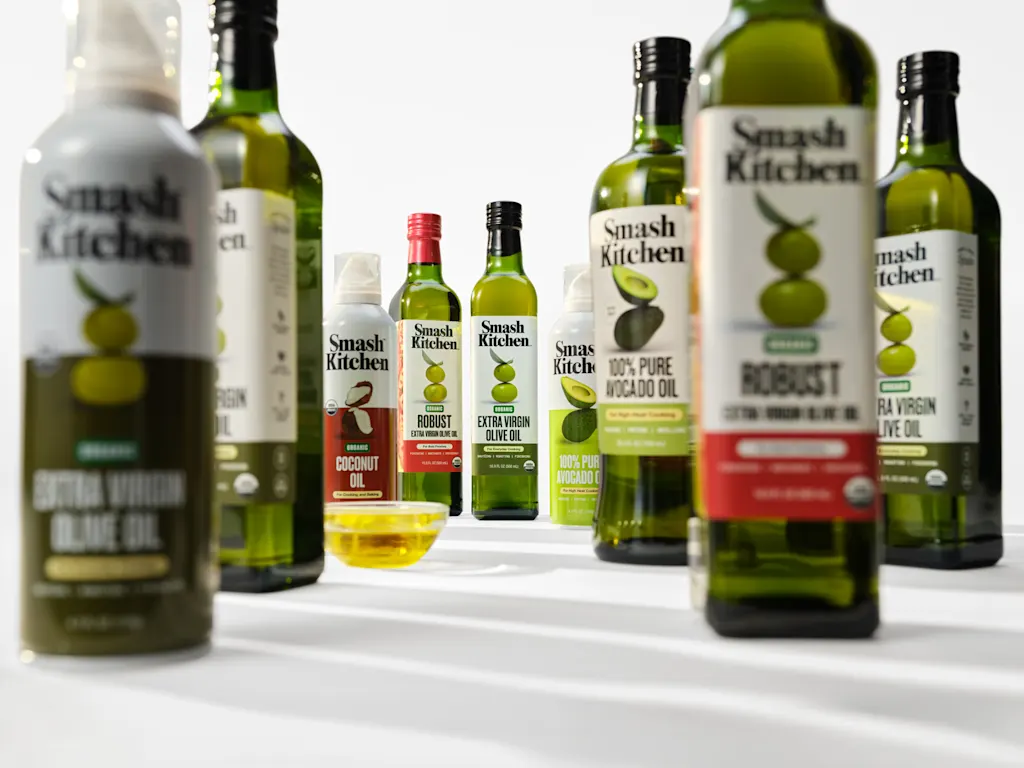
Sales figures shared exclusively with Fast Company show that . . .
Smash Kitchen has generated more than $10 million in sales since April, and is on track to top $20 million by the end of the year.
As Powell told me from his home in Austin—just hours before slinging burgers for his neighbors—cooking oils are a crucial part of his broader goals for the brand. “The intention was always for us to take over the American pantry,” he says.
Thanks to the brand’s bona fides, consumers becoming increasingly ingredient-conscious, and Walmart’s efforts to capture those consumers’ dollars, Powell is poised to become the leading man of the Walmart shopper’s basket.
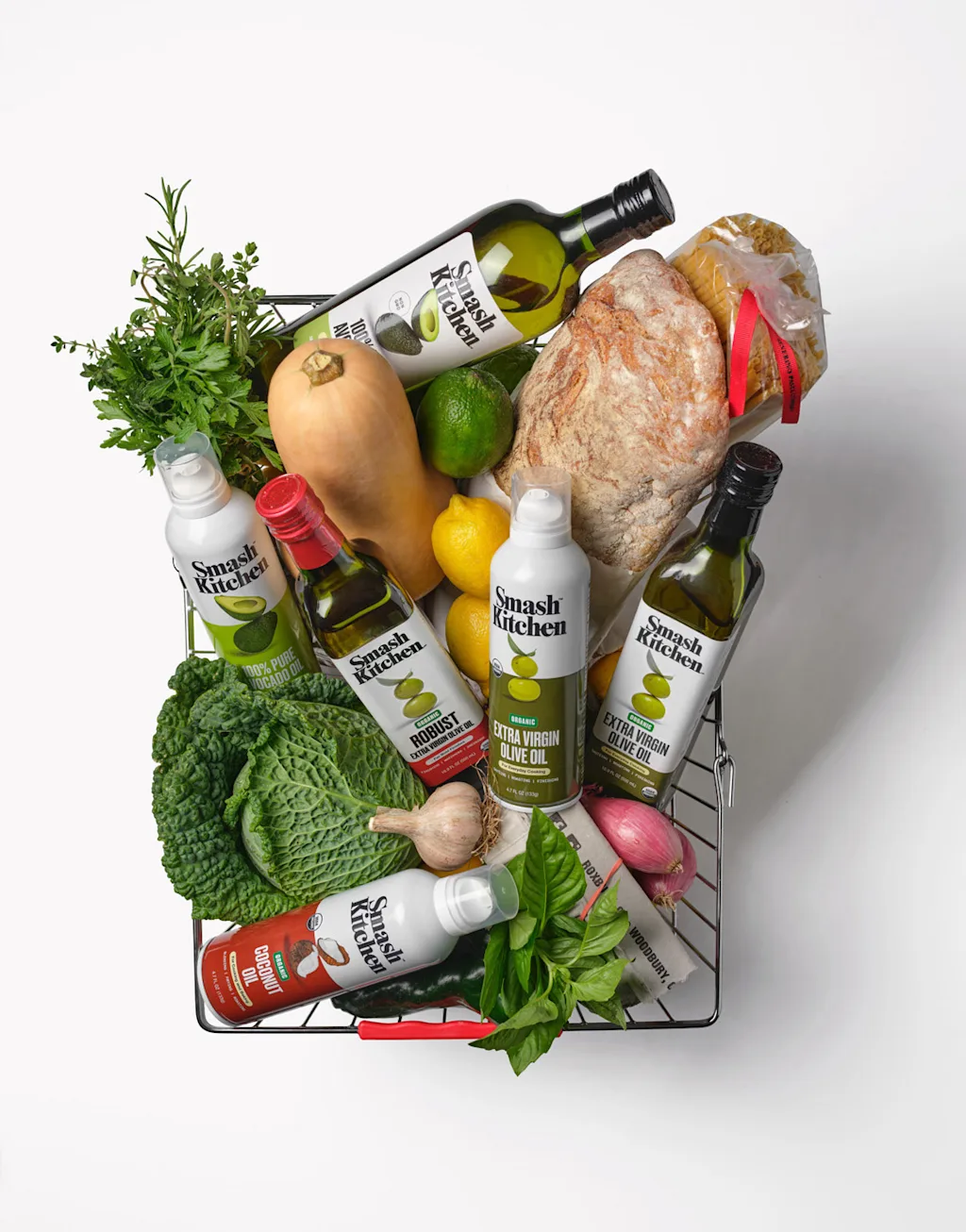
The right time for a challenger
Smash Kitchen started with Powell’s interest in making organic food accessible to more people, but it took off when he met two veterans of popular consumer brands. With Sameer Mehta, cofounder of dog food brand Jinx, and Sean Kane, who helped launch celeb-led brands the Honest Co. (with Jessica Alba) and Hello Bello (with Kristen Bell and Dax Shepard), he settled on the idea of reformulating pantry basics.
The trio decided to start with condiments, a $12 billion market, according to Mintel. And the timing couldn’t be better.
Though the market is dominated by large legacy brands, data from Boston Consulting Group (BCG) shows big companies—those with more than $1 billion in annual sales—lost share by about 3% between 2020 and 2024. In the same timeframe, smaller condiment manufacturers, with revenue under $1 billion annually, have grown share by 2.2%, while private label has grown 0.9%. It’s happening at a time when BCG’s data shows growth flatlining in categories associated with heavy processing.
But brands that have positioned themselves as focused on ingredients, like Kraft Heinz’s Primal Kitchen and Unilever’s Sir Kensington’s, tend to be sold at higher price points or in higher-end stores. Powell was determined to create products that contain better ingredients but are accessible to everyday Americans.
“I didn’t grow up in a place where I was able to buy organic,” he says. “You buy what you can afford.”
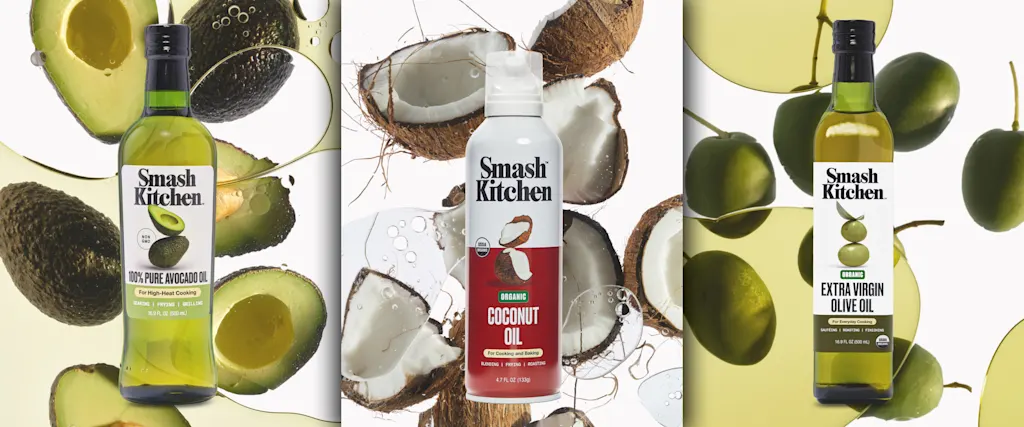
Expanding Smash Kitchen’s Range
Now Smash Kitchen has entered the cooking oil aisle, and a market segment that’s expected to reach $7.5 billion by 2028.
The company has created an extra-virgin olive oil, an avocado oil, and a coconut oil, all free of artificial preservatives and flavors, all available in both traditional and spray bottles. As with condiments, Powell says price was a key consideration. “We spent time sourcing the best avocados and olives and coconuts,” he says. “But we’re trying to understand how to be as efficient as possible, to make sure we can get the best prices for the customer.”
That’s where his cofounders Mehta and Kane bring their expertise at scaling cleaner products affordably (they also used their past experience with Walmart to snag the retailer as Smash Kitchen’s launch partner). With 4,500 U.S. stores and the accompanying logistics capabilities, Mehta says Walmart has “provided the scale for us to command a really great price.”
Dan Frommer, retail expert and founder of The New Consumer, says launching at Walmart is not easy task. It requires a lot of capital for manufacturing inventory, as well as expertise in logistics to get products into stores and onto shelves. “Going from zero to Walmart’s scale is impossible for many brands,” Frommer says. “As a startup, you need to have deep pockets, as well as a very strong ground game.”

Walmart’s evolution
Meanwhile, Walmart has also focused on appealing to the changing tastes of U.S. consumers. The company just announced that it will eliminate synthetic dyes and other additives from all in-house brands by 2027. Last year it launched a new private-label brand called Bettergoods that is carefully calibrated to customers’ desires, including more organic ingredients.
Many American consumers are cutting down on their household spending because of inflation and worries about the economy. Walmart has benefited from this trend, acquiring more customers with household incomes above $100,000 and $200,000 who may be opting to shop at the retailer instead of more expensive grocers like Whole Foods. “Walmart has done a really good job of making their assortment friendly to higher-income consumers,” Frommer says. “If you wanted healthy soda or snacks, you previously had to go to Whole Foods, but you can now get many of them at Walmart.”
Still, these cleaner brands often cost more than legacy national brands. Smash Kitchen ketchup costs $3.97, while Heinz is $3.59. Smash Kitchen’s organic extra-virgin olive oil is priced at $8.97 for a 16.9-ounce bottle, while Walmart’s in-house brand costs $7.36. But the newcomer’s success suggests that its prices are not cost-prohibitive. “For core consumers, this is an affordable upgrade,” says Melody Richard, Walmart’s SVP of Pantry. “And for higher-income customers, these are much more affordable prices than they’re used to paying elsewhere.”

The Celebrity Brand Playbook
Call it (Paul) Newman’s law of celebrity brands: For every celebrity brand with a dedicated celebrity founder, like Newman’s Own, there is at least one that just slaps a celeb likeness or endorsement on some white-label products.
Kane—who partnered with Alba, then Bell and Shepard, on new brands—says Powell takes his role as cofounder seriously. Powell has taken a particular interest in taste-testing the products. “Growing up in middle America, a lot of my friends and family assumed that organic food just doesn’t taste as good,” Powell says. “I’m trying to show that foods that are good for you can also taste great.”
But Powell’s biggest asset to the brand is his enormous platform. It can be hard for new brands to break out in a crowded market. Powell is prominently featured in posters on Walmart endcaps featuring Smash Kitchen products, and he promotes the products in videos across social media, including one in which he’s a “condiment sommelier.”
“We’re really fortunate to have somebody like Glen who has a microphone neither of us have,” Mehta says. “He’s on track with culture and social media. We don’t just need shelf space at a big retailer, we need a microphone to tell the story of what it means to be a clean, organic label.”
Kane says his work launching brands with celebrities has taught him that that their long-term success depends on being able to stand on their own. For instance, the Honest Co. continues to do well even though Alba stepped away from the role of chief creative officer last year. “The smart thing to do is to use the celebrity for the first year or two as a launch mechanism,” says Frommer. “Ultimately, people are only going to keep buying them over and over if they like the product and if they serve a purpose in their life.”
That is certainly Powell’s hope—that the brand stands on its own, and that people continue to buy Smash Kitchen products because they love them, not because of the company’s famous founder. “This is why I’m not putting my face on the bottle,” he says.

